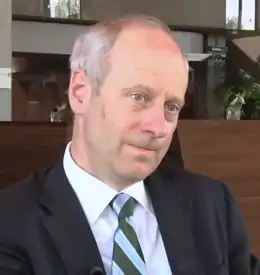Michael Sandel
Michael J. Sandel (né le à Minneapolis) est un philosophe politique américain. Il est professeur à Harvard, au sein du département de science politique. On peut rattacher son œuvre au courant communautarien de la philosophie politique américaine, notamment de par le type de critique de la théorie de la justice de John Rawls qu'il a développé dans Liberalism and the Limits of Justice (1982).

| Naissance | |
|---|---|
| Nationalité | |
| Formation |
Balliol College Université Brandeis Palisades Charter High School (en) |
| École/tradition | |
| Influencé par | |
| Distinctions |
Son cours intitulé « Justice » a été suivi par plus de 15 000 étudiants à Harvard[1] et filmé par une télévision de Boston qui l'a diffusé aux États-Unis en 2009. Il fait l'objet de traductions au Japon et en Chine, y rencontrant un grand succès[1]. Son livre Justice, what's the right thing to do s'est vendu à plus d'un million d'exemplaires en Asie du Sud-Est[1]. Michael Sandel a été nommé « Personnalité étrangère de l'année » 2011 dans l'édition chinoise de Newsweek[1].
Vues philosophiques
Michael Sandel soutient les vues du courant communautarien (même s'il réfute d'y être associé), et il est connu pour sa critique de la théorie de la justice de John Rawls[2]. Pour lui, le contexte du libéralisme ne permet pas de juger la propriété et la communauté à partir d'attributs intrinsèques à l'individu (la liberté, l'égalité et la différence est analysé par l'individu chez Rawls), mais à partir d'attributs extrinsèques.
Bibliographie
en anglais
- Liberalism and the Limits of Justice, Cambridge University Press, , 231 p. (ISBN 978-0-521-56741-1, lire en ligne)
- Democracy's discontent : America in search of a public philosophy, Belknap Press of Harvard University Press, , 417 p. (ISBN 978-0-674-19745-9, lire en ligne)
- Public philosophy : essays on morality in politics, Harvard University Press, , 292 p. (ISBN 978-0-674-02365-9)
- (en) The case against perfection : ethics in the age of genetic engineering, Cambridge (Mass.), Belknap Press of Harvard University Press, , 162 p. (ISBN 978-0-674-01927-0, lire en ligne)
- (en) Justice : What's the Right Thing to Do?, Farrar, Straus and Giroux, , 308 p. (ISBN 978-0-374-53250-5)
- (en) What money can't buy : the moral limits of markets, New York, Farrar, Straus and Giroux, , 244 p. (ISBN 978-0-374-20303-0)
- (en) The Tyranny of Merit : What’s Become of the Common Good?, Allen Lane, , 288 p. (ISBN 978-0241407592)
en français
- Le libéralisme et les limites de la justice [« Liberalism and the Limits of Justice »] (trad. Jean-Fabien Spitz), Seuil, , 329 p. (ISBN 978-2-02-032630-8)
- Ce que l'argent ne saurait acheter : les limites morales du marché [« What money can't buy: the moral limits of markets »] (trad. de l'anglais par Christian Cler), Paris, Seuil, , 336 p. (ISBN 978-2-02-117323-9)
- Justice [« Justice: What's the Right Thing to Do? »] (trad. de l'anglais par Patrick Savidan), Paris, Albin Michel, , 416 p. (ISBN 978-2-226-31499-4)
- Contre la perfection : L'éthique à l'âge du génie génétique [« The Case against Perfection – Ethics in the Age of Genetic Engineering »], Vrin, (ISBN 2711625923)
- La Tyrannie du mérite : Qu'avons-nous fait du bien commun ? [« The Tyranny of Merit: What’s Become of the Common Good? »], Albin Michel, , 384 p. (ISBN 978-2226445599)
Notes et références
- Thomas L. Friedman, "Justice Goes Global", New York Times, 14 juin 2011; https://www.nytimes.com/2011/06/15/opinion/15friedman.html
- Voir notamment, P. Ansay, "Michaël Sandel et les fondamentaux de la philosophie communautarienne", Politique, revue de débats, Bruxelles, n°81, septembre-octobre 2013, pp. 76-81.
Liens externes
- Ressource relative à la vie publique :
- (en) C-SPAN
- Notices dans des dictionnaires ou encyclopédies généralistes :
- (en) Site de Harvard
- (en) Une recension de Case Against Perfection
- (en) Le cours « Justice »